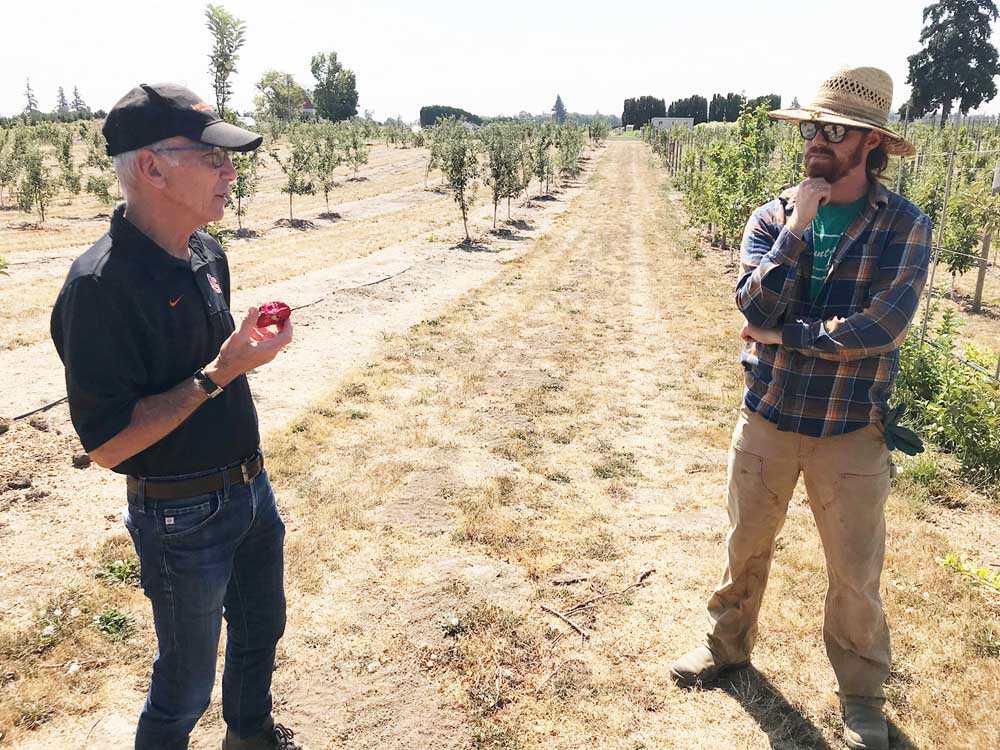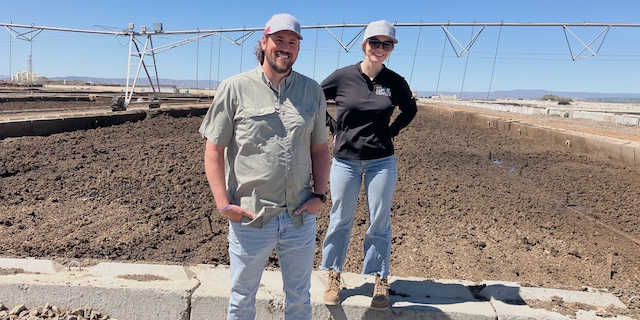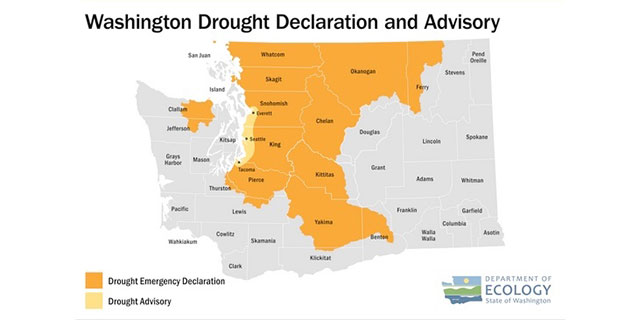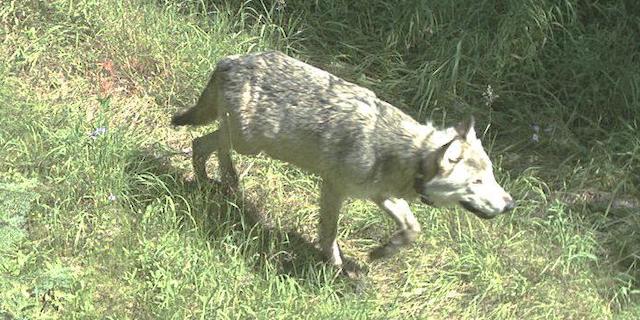Western Innovator: Longtime OSU Extension research station director to retire
Published 12:45 pm Wednesday, October 13, 2021

- Mike Bondi, left, station director at the North Willamette Research and Extension Center, chats with Kody Transue, a biological research technician, about new research into growing cider apple varieties at the farm.
AURORA, Ore. — It doesn’t take long to glean the diversity of crops at Oregon State University’s North Willamette Research and Extension Center.
The 160-acre farm 20 miles south of Portland is a microcosm of the high-value agriculture found throughout the Willamette Valley — everything from berries, hazelnuts and fresh vegetables to Christmas trees and ornamental plants grown in nurseries.
Mike Bondi has been the station’s director since 2011, overseeing dozens of faculty and projects to help producers thrive economically.
Under his leadership, NWREC has added several new initiatives to keep pace with the changing needs of agriculture.
On June 30, 2020, Bondi announced his retirement from OSU Extension Service but has remained at the station while the university continues to hunt for his replacement. A search is currently underway, and could wrap up by the end of the year.
After 43 years with OSU, Bondi, who turned 70 in October, said the thing he will miss most is the people.
“Just the partnerships, creativity and support they’ve provided has made it an amazing and worthwhile career for me,” he said.
‘Last man standing’
By his own admission, Bondi never intended to be an administrator.
He was originally hired in 1978 as an extension forestry agent on the North Oregon Coast, and focused on helping small woodland owners to better manage their trees and property. Seven years later, Bondi transferred to Clackamas County in the same role.
Bondi is perhaps best known for establishing the Clackamas Tree School in 1991. It has grown into the largest one-day educational event for private forest owners in the U.S., with registration capped at 600 attendees.
“Their needs are so diverse,” he said. “That’s one of the things that was really fun working with that group of people.”
In 2010, OSU Extension Service underwent a reorganization. Instead of having individual staff chairs at each county office, management was split into a dozen regions statewide.
Bondi was appointed manager of the Clackamas Region, overseeing the extension office in Oregon City as well as NWREC.
“I was, frankly, kind of the last man standing,” he remembers. “My colleagues had all either retired or were on their way out the door.”
Key additions
Within a short distance of NWREC is about 40% of the state’s $5 billion in total value of agricultural products.
“The Willamette Valley is the most diverse part of Oregon agriculture in terms of crops that are grown,” Bondi said. “And, that’s where all the high-value crops are.”
Established in 1957, NWREC primarily serves growers in Clackamas, Marion, Polk, Yamhill, Washington, Multnomah and Columbia counties. The original three pillars of research were greenhouse and nursery crops, berries and commercial vegetable production.
Today, Bondi said the station has 10 programatic areas. “It is without a doubt, of all the research centers in the state, the most diverse,” he said.
Even before taking over as manager, Bondi was influential in bringing the Small Farms Program and Christmas tree research to NWREC in the mid-2000s. In 2015, the station hired Nik Wiman to study hazelnuts and orchard crops, followed by Nicole Anderson to study field crops including grass seed and legumes.
More recently, the Oregon Legislature approved funding in 2019 for organic research at NWREC, Bondi said, which grew out of the Small Farms Program.
The station has also dedicated 5.5 acres to a new agrivoltaics experiment, known as the Staterra Center, studying how agriculture may be combined with renewable energy production to create more sustainable farms in the future.
Today, NWREC has 35 full-time faculty members and last summer hired 28 college and high school students to support expanding research programs.
While the station remains committed to its core industries, Bondi points out several projects committed to evaluating new crops not yet commercially grown in the Willamette Valley — such as olives, almonds, cider apples and quinoa.
“We’ve made some key additions, but it’s all about serving the needs of agriculture,” he said. “That’s what I feel best about. We’re better positioned to meet the needs of the agricultural community in this valley.”
Public outreach
Demonstrating the value of farming is particularly important in the Portland metro area to help bridge the urban-rural divide, Bondi said.
Every year, NWREC hosts a community open house in July (excluding the pandemic) to show the public what is happening in their fields and laboratories. A harvest dinner also highlights the region’s bounty, and underscores how food makes it from farm to table.
“It’s all about building community,” Bondi said. “I think that’s a lot of what the university does.”
Looking ahead to retirement, Bondi said he plans to spend more time with his grandkids and volunteering with the nonprofit group Forests Forever, which he co-founded in the early 1990s. The organization manages nearly 500 acres of working forests for public education about timber resources.
“I’ve always loved what I do,” he said. “If you can make your avocation your vocation, that’s how I always thought it should be.”
Age: 69
Hometown: Lake Oswego, Ore.
Family: Wife, Connie, and adult son Aaron
Occupation: Director, North Willamette Research and Extension Center
Education: Bachelor’s degree in forest management, Iowa State University, 1973; master’s degree in forest science, University of Canterbury, Christchurch, New Zealand, 1975






